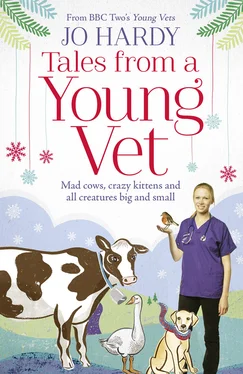Cat blood types are commonly A or B, and occasionally AB. It’s dangerous to give them the wrong type – it would kill them – so we needed to find a match to Pepsi’s A-type blood. The QMH had a long list of willing donors, but finding one meant ringing to ask the owners to bring their pet in to have blood taken. The whole process could take half a day or so, and given that it was now late in the evening, possibly longer.
Pepsi was taken through to the Intensive Care Unit and placed gently into a cage lined with a soft blanket, where the nurses would keep a close eye on her until it was time for her transfusion.
While I was there I nipped over to check on Misty, the Westie with the severe bee-sting reaction. She was fast asleep, her breathing was normal and so was her temperature. She would almost certainly make a full recovery, and I knew just how much that would mean to Mrs Stevens.
The new patients rolled in non-stop that night, and I would discover over the following week that this was the norm. We students would deal with a patient and then run to take the next on the list. It was so busy that after the first few cases I forgot all about my nerves; I just had to get on with it.
Adrenaline-fuelled, I was buzzing, with no time to stop or to eat. Around midnight Stacy, one of the interns, stopped me in the corridor as I headed back to reception for my next case. ‘Take a break after this next one and get some sugar into you or you’re going to collapse,’ she said in a tone that brooked no argument. The interns and clinicians were well aware of how easy it was to forget to eat and end up making yourself ill.
That night I saw a dog with heart failure, another with unexplained bleeding and a cat with seizures. After each assessment I would report back to Giacomo or one of the interns, and we would discuss what might be wrong and what should be done.
More than once I had to hazard a guess under the fierce gaze of an intern waiting to know what my diagnosis was. Thank goodness most of the time I got it right – and each time that happened it boosted my confidence a little more.
Around one in the morning, after I’d wolfed a bar of chocolate and downed most of a cup of tea, the phone shrilled again. Off I went, hurrying back towards the waiting area to collect a dog I’d been told was in a lot of pain.
I could hear his howls and whimpers from the other end of the corridor. I arrived to find a young yellow Labrador lying on the floor yelping. His owner, wrapped in a huge parka, looked exhausted. He introduced himself as Doug.
‘Barney’s nine months old, he’s normally the life and soul, but he’s not been himself today,’ Doug said, raising his voice to make himself heard over Barney’s cries. ‘Tonight I got home from a night out to find him like this. I can’t think what’s happened.’
I had a pretty good idea, but I needed to be sure. I knelt beside him in the waiting room to give him a quick check. His abdomen was bloated and tight, and he yelped when I touched it.
‘He’s very bloated. I’m afraid this could be quite serious. Would you mind waiting? I’ll take him straight through to the senior vets, then come back to get a fuller history from you while they start working on him.’
I ran to get a trolley to wheel Barney through to the ER. Doug helped me to lift him gently onto it and then patted him on the head. I wheeled him through the double doors and Stacy rushed over. ‘He’s really bloated. I think it’s a twisted stomach,’ I said. She checked him over, put the ultrasound probe on him to confirm the diagnosis and nodded.
‘OK, he’ll need surgery, but first we need to deflate his stomach; the build-up of gas is what’s hurting him. Jo, you can do this.’
We clipped a small patch of fur from Barney’s abdomen and applied antiseptic, then Stacy handed me a two-inch-long needle. Clenching my teeth, I plunged it straight through the clipped area and into Barney’s stomach.
The whoosh of gas escaping sounded a bit like a balloon when you blow it up and then let go. Almost immediately Barney calmed down and stopped howling. I knelt and stroked his head. ‘You’ve had a tough time, haven’t you, young chap?’ Barney raised his head, licked my hand and managed two thumps of his tail.
A few minutes later he was taken to a kennel in the Intensive Care Unit to be prepped for surgery while I went back, with Stacy, to talk to Doug and to take Barney’s history.
‘What is a twisted stomach?’ he asked. ‘How did it happen?’
‘It’s not uncommon in deep-chested breeds of dog,’ I told him. ‘It’s a condition called gastric dilation volvulus or GDV, in which the stomach twists and dilates when it can’t expel food or gas. The blood supply can also be cut off. GDV sometimes happens after a big meal followed by exercise, but frequently there isn’t an obvious reason.’
‘Barney always seems to be hungry,’ Doug said. ‘He steals anything he can get hold of; we have to keep all our food out of reach. The only things he doesn’t seem to like are carrots. Yesterday he ate my son’s headphones, a plate of biscuits and the insole of a boot.’
I laughed. ‘That’s a Lab for you. Happy dogs, but big eaters. What happened to Barney wasn’t necessarily anything he ate; we still don’t know all the reasons why dogs get twisted stomachs.’
I explained that we’d relieved the pressure of the build-up of gas, which could eventually have ruptured the stomach wall, and that Barney would need immediate surgery to return his stomach to the right position and to check for any other internal damage. ‘He’s sleeping now, we’ve given him pain relief and we’ll give you a call as soon as he’s out of surgery.’
‘Thanks.’ Doug smiled. ‘I’ll be off then. Got to get up for work at six.’
I looked at my watch. It was ten past two. Ten hours into my shift and there were still new patients coming through every few minutes.
By three things were quieter and at half-past Stacy told me I could go.
‘Have you had fun?’ she grinned. ‘ECC can be a bit of a baptism of fire.’
‘I’ve loved it,’ I said. ‘I felt like a real vet tonight.’
As I headed out to the car park the hospital’s hushed corridors felt peaceful. For a brief hour or two, until the day staff began to arrive, everything was calm.
I climbed into my little Volvo C30 and drove back to the house I shared with four other vet students in the village of Welham Green, five minutes from the campus. It just so happened (honest) that the other four were boys, despite the fact that eighty per cent of students in my year were girls. But despite the teasing I’d had from some of my friends, there was strictly no romance with any of them – we all just got on really well.
The house was in darkness as I crept in through the front door and made my way into the kitchen. Even Buddy, the sixth member of our household, a funny little mutt that one of my housemates had inherited from his grandparents, barely stirred in his basket.
Despite the late – or was it early? – hour, I was still buzzing with all that I’d learned and done over the past twelve hours. I made myself a cup of tea and a piece of toast – standard post-night-out fare – and sat at the kitchen table.
Fifteen minutes later the exhaustion hit me. I crawled upstairs and was asleep within seconds.
Конец ознакомительного фрагмента.
Текст предоставлен ООО «ЛитРес».
Прочитайте эту книгу целиком, купив полную легальную версию на ЛитРес.
Читать дальше












